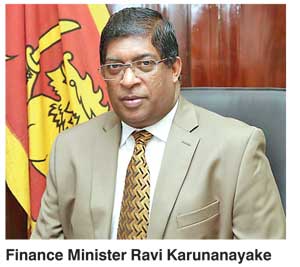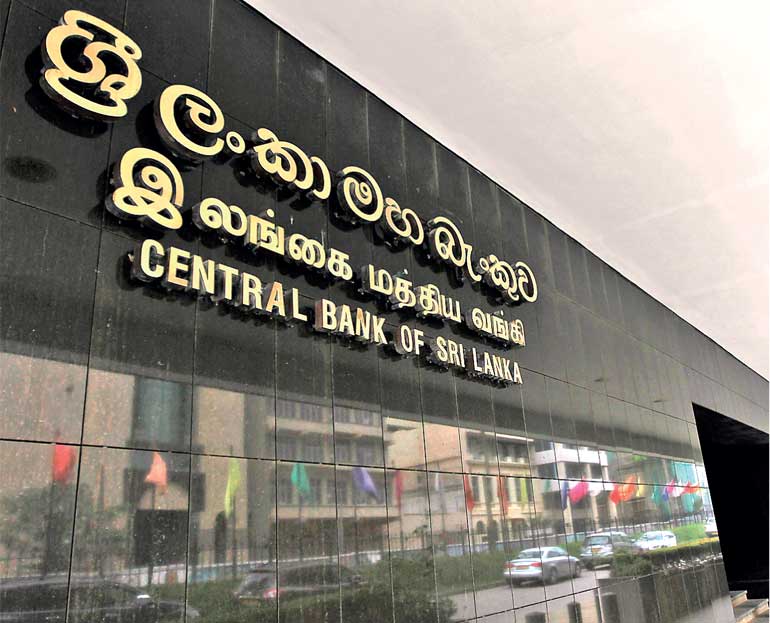Monday Feb 16, 2026
Monday Feb 16, 2026
Monday, 24 April 2017 00:00 - - {{hitsCtrl.values.hits}}
 From the perspective of the Government, the following are the key components of a checklist for assessment and validation prior to the enactment of the proposed Foreign Exchange Bill.
From the perspective of the Government, the following are the key components of a checklist for assessment and validation prior to the enactment of the proposed Foreign Exchange Bill.
Does the Bill in its present form, post enactment:
1.Advance the delivery of election promises of the Government? i.e. Promote the delivery of sustainable and inclusive macroeconomic growth and monetary stability, attracting new foreign and local investments, creating new job opportunities, encourage technology transfers and reverse brain drain, advance good governance, rule of law and justice processes, advance transparency and minimise corruption and waste?
2.Become a key enabler of the governance capability to meet the current and future challenges of the emerging sociopolitical and economic environment and effectively manage potential emerging risks?
3.Become a priority reform facilitation pillar in the governance structure and in meeting the set of key delivery objectives of the Government, including any planned strategic initiatives in the governance yet in the pipeline e.g. Key economic zones, offshore financial city operations, infrastructure and associated legislative reforms, etc?
4.Have lessons from the past (local and foreign) been taken cognisance in the bill?
5.Be acceptable in terms of International Conventions and benchmarks and best practice standards looked up to by international agencies, funding institutions and foreign investors?
For the undernoted key reasons, it appears that the Bill in its present form fails to meet the assessment benchmark criteria listed above.
1.This Bill, along with the:
a.Proposed laws and regulations governing key economic zones, foreign investments, offshore financial city operations, and connected policy framework and associated incentive structures
b.Proposed provincial and regional development and state infrastructure development policies and incentives
c.Framework for public private partnerships, laws and regulations governing state procurement and associated procedures for major capex and revenue spends
d.Laws and long-term policy framework applicable to land and labour
e.Principles and proposed reforms governing taxation, customs and excise
f.Other key administrative reforms advancing ease of investment and doing business
g.Legal reforms including those addressing minimising law delays and perceived high levels of bribery, corruption and waste
Should have been published as white papers and green papers and adopted by Parliament following transparent intellectual and stakeholder debate and thus this Bill not seen as a standalone priority in governance advancing any specific interest groups.
2.Introducing the reform Bill in the backdrop of:
a.Low country credit ratings
b.A looming debt crisis
c.Possible higher levels of early exists by foreign bond and equity market holders
d.The option of rollover of foreign debt being in an environment of high risk premiums
e.In the midst of an IMF Extended Fund Facility
f.Some high level announcements of inward private fund transfers and significant foreign direct investments not being realised
g.Financial market credibility negatively impacted by purported high level conflicts of interests led bond scams
h.Media highlights of possible high level money laundering and market manipulations and resultant financial institution failures
And thus seen as ill-timed and likely to enhance risks and are seen as unlikely to promote attracting new forex investments and FDI’s.

3.Key members of the Cabinet, the Executive and key heads of functions having direct association with the objectives of the enactment, promotion of and regulation of foreign exchange post enactment appears to have not been deeply associated/consulted nor been shapers of the new legislation and are thus unlikely to be motivated and committed to promote and effectively regulate post enactment. Thus these key persons and institutions are unlikely to be in a position post enactment to effectively meet investor, user and servicing agencies raised issues, clarifying queries and assisting in the effective promotion and regulation.
4.Learning lessons from past experiences and seeking best advice and technical support in the development of the Bill by effective engagement with the following key resource institutions and resource persons does not appear to have been formally carried out:
a.Central Bank and associated Exchange Control Department
b.Financial Investigation Unit Sri Lanka
c.Board of Investments
d.Export Development Board
e.Anti Corruption Secretariat and State Asset Recovery Unit
f.Key Investigation Units – CID, CCD, FCID, CIABOC
g.Experienced key prosecutors of the Attorney General’s Department
h.Commercial Banks Association
i.Private Sector Chambers
j.Professional Associations
In the backdrop of investigations currently in progress revealing that ‘Know Your Customer’ (KYC), FATF 40 Recommendations, High Risk

Transactions/Persons linked special validations, Violation of Sri Lanka Accounting Standards, Transparent Reporting and Reporting of Related Party Transactions and Conflicts of Interests not being effective; and Professionalism and Independence of Auditors, Lawyers, Valuers and Directors coming into serious question.
5.Despite section 7 (2) of the draft Bill requiring the Minister in making regulations to have regard to “transactions required to be regulated in conformity with any treaty or agreement relating to international financial transactions to which the Government of Sri Lanka is a signatory”, it is unclear as to whether any persons of authority , knowledge and capability have validated the specific provisions of the Bill in terms of the following obligations of the State;
a.UN Convention Against Corruption
b.Financial Action Task Force Recommendations
c.Financial Transactions Reporting Act of 2006
d.Commitments arising from the Anti-corruption Summit London 2016
6.International and local research studies, economic and social indicators and other clear signals visible indicating a significant informal/black economy, a high degree of undervaluing and over valuing for customs, marketing of overseas investment options, trusts and financial instruments, high incidence of narcotic shipments/transshipments, perceived high incidence of gold and currency smuggling and perceived high degree of money laundering, all being amber signals of potential risks post enactment
7.The key decision making functions and highest level authority and empowerment in the management and governance under the proposed Bill, appears to shifts from an expertise and experience empowered, citizen recognized independent public institution of the Central Bank to a politically elected individual minister, leaving the Monetary Board and the Central Bank accountable for monetary stability assurance under the Monetary Law with only the agency functions in implementation, that function also as per Ministerial directions and thus violates the accepted best practice principles of management and control. Sections 2 (2), 4 (2) c, 7 (1) and (2) and (10), 8 (1) and (3), 9 (1 to 4), 11(1), 13, 21 (1) d and e, 22, 1 and 3) 30 (3)
8.Where the Monetary Board advises the Minister that the remittances of foreign exchange in to or out of Sri Lanka constitutes a potential threat to the financial stability of Sri Lanka, the Minister may with the approval of the Cabinet take steps to restrict or regulate remittances of foreign exchange for a period not exceeding six months and with the agreement of Parliament the Minister may extend such period to an aggregate not exceeding 12 months. Sections 22 (1,2, and 3)
9.The reform structure and management mechanisms now proposed appears to significantly differ (without adequate justification), from a draft Bill developed by the Financial Sector Reforms Committee, under the same regime, in early 2000.
10.The proposed Bill has the undernoted provisions, which prior to enactment should have been transparently disclosed and intellectually debated, with the engagement of persons and institutions listed in a) to j) in point 4 above and other interested parties, having ensured that adequate risk mitigation measures are also in place, especially to prevent the promotion of money laundering;
a.Central Bank is empowered to grant special permission to any person, not being an authorised dealer or restricted dealer, to deal in foreign exchange within Sri Lanka for specific purposes prescribed by the Minister by gazette Sections 4 ( c))
b.Empowers the Minister in consultation (not with concurrence) with the Monetary Board and with the approval of the Cabinet to authorise by regulation capital transactions in foreign exchange; and in making such regulations the Minister shall have regard to
i.Transactions regulated by international conventions
ii.Impact of such authorisations on the monetary policy and its stabilisation Sections 7 (1 and 2)
c.On directions of the Minister the Monetary Board can in exceptional circumstances allow capital transactions outside the regulated framework Section 7 (10)
d.Notwithstanding anything to the contrary in the provisions of any other written law, Sri Lankans resident in Sri Lanka, who remits to Sri Lanka any foreign exchange, which have been declared to the Inland Revenue or Exchange Control before the appointed date and which are not the property obtained by money laundering, terrorist financing or bribery, shall be liable to pay remittance fee to the Inland Revenue at the rate prescribed by regulation and shall not be subject of any other fee, tax, surcharge or levy; provided however where these remittances are invested in Development Bonds of the Government, no fees, tax, surcharge or penalty will arise; and there will be no restriction of repatriation of such remittances. Section 8 (3 and 4)
e.The Central Bank is required to obtain the approval of the Minister to issue guidelines and directions to authorised dealers and restricted dealers engaging in capital transactions and those not being authorised dealers/restricted dealers in engaging in permitted transactions Sections 9 (1,2,3 and 4)
f.Central Bank is empowered to obtain for statistical and monitoring purposes information and returns from authorised dealers and restricted dealers covering period of up to six years before the request ( no reference to others permitted) Section 9 (5)
g.Central Bank may cause investigation to be carried out at any time by a person authorised by the Bank, in to foreign exchange transactions or foreign assets of any authorized dealers or a restricted dealer or any other person as the case may be; however the Central Bank can only with the approval of the Minister issue notice directing any such dealers who have acted contrary or contravened any provisions to comply with the provisions of the Act Section 10 (1)
h.Every investigation and inquiry should be concluded within six months unless an extension is obtained with the approval of the Minister; The Minister will appoint the Board of Inquiry in to appeals Section 29 (2) b
i.All pending investigations under the Exchange Control Act shall be concluded within a period of six months from the appointed date.
11.The Central Bank has the power, after an inquiry to temporarily suspend or with the approval of the Monetary Board to revoke the authorisation permit granted to an authorised dealer or restricted dealer who has acted contrary to provisions of the act; or in the alternative require such dealer to pay the Central Bank an amount not exceeding amount or value of such foreign asset or any part thereof together with applicable expenses or suspend dealings for a period not exceeding 12 months ; and where any other person not being an authorised dealer or restricted dealer in violation of the provisions, the Central Bank with the approval of the Minister to require such person to pay a penalty not exceeding Rs. 1 million. Section 11
12.In the light of media exposure and reported findings of the investigators, associated public perceptions and demands for effective justice with heavy penal sanctions for violators of foreign exchange laws, with reports indicating significant value of unauthorised foreign exchange transactions and associated criminal offences and remittance of proceeds of crime, whether foreign exchange linked offences should be devoid of penal sentences and subject to a maximum penalties as detailed earlier will require public debate and seeking the views of those listed in point 4 above.